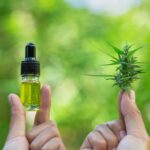How Long Does CBD Last?
CBD (cannabidiol) is a popular natural health solution. CBD’s effects attract more individuals who want to know how long it lasts. Understanding the duration of CBD in your body is essential for responsible use and potential interactions with medications. This article will explore the five most important factors that can influence how long CBD remains in your system. Let’s delve into each factor and better understand CBD’s effects and metabolism.
Learn More: CBD Oils & Tinctures 101
How CBD is consumed affects how long it takes to take effect and how long its effects remain. Each sort of CBD product has its characteristics:
- Oils and Tinctures: CBD oils and tinctures are consumed by placing drops beneath the tongue or mixing them with food or drinks. Sublingual consumption allows faster absorption into the bloodstream, leading to quicker effects.
- Capsules: CBD capsules offer a convenient and precise way to take CBD without calculating dosages. Capsules are discrete and odorless, making them ideal for travel.
- Edibles: CBD-infused edibles, such as gummies and honey sticks, are popular for their convenience and pleasant taste. Edibles take longer to work since they must travel through the digestive system.
- Topicals: CBD topicals are applied to the skin and absorbed into the body. Salves, creams, lotions, gels, and balms contain them. Topicals are non-systemic and give localized pain relief.
Individual metabolism varies from person to person and affects how quickly the body processes and eliminates substances, including CBD. Our bodies use complicated biochemical mechanisms to transform food into energy and waste. Genetics, age, gender, weight, and health affect it. These factors significantly influence how efficiently our bodies process different substances, including CBD.
Learn More: How Much THC Is In CBD Oil
As their systems break down and eliminate substances, those with higher metabolisms may remove CBD faster. CBD’s effects may last less in faster-metabolizing people.
CBD may last longer in slower-metabolizing people. Their bodies take more time to break down and eliminate CBD, leading to extended effects of the cannabinoid. This slower clearance from the system can benefit individuals seeking prolonged relief from their health conditions or symptoms.
It’s important to note that metabolism is dynamic, and various factors can influence its speed at different times. Medication and exercise may alter metabolism. Age and lifestyle may also alter metabolism.
The amount of CBD you consume also impacts its duration in your system. As with many drugs and supplements, greater doses take longer to metabolize and excrete. The body may take longer to metabolize a greater CBD dosage. CBD’s effects may stay longer at higher dosages. Low-dose CBD may be metabolized and eliminated faster, resulting in shorter-lasting effects.
The frequency of CBD consumption also influences how long it stays in your system. When you take CBD regularly or daily, the cannabinoid may accumulate in your body over time. With continuous usage, CBD may build up in your system, making it more stable. Thus, the body may take longer to eliminate CBD, prolonging its effects.
Learn More: How Much CBD Should Be In Edibles?
However, occasional CBD consumption helps the body digest and remove the chemical. CBD accumulates less and has shorter effects when taken less often.
- Taking CBD with or without a Meal:
Consuming CBD with or without food can affect its absorption and metabolism. Food in the digestive system can impact how CBD is absorbed and utilized by the body.
When you take CBD with a meal, digestion slows down the absorption of CBD. Since CBD enters circulation slowly, its benefits might last longer.
CBD may be absorbed faster on an empty stomach, but its benefits may wear off faster.
CBD’s Metabolism: How Long Does It Stay In Your System?
CBD’s metabolism and elimination from the body can vary among individuals. CBD’s half-life is 1 to 2 days. This implies half of the CBD is removed in 1–2 days. However, this is an average estimate, and individual characteristics may affect CBD’s actual duration in the system.
Learn More: How Long Do CBD Gummies Last
CBD retention is affected by the following:
These factors may affect CBD’s half-life:
- Individual Metabolism: As discussed before, individual metabolism considerably determines how long CBD remains in the body. Those with faster metabolisms are likely to process and eliminate CBD more quickly, while individuals with slower metabolisms may have CBD lingering longer.
- Dosage: The amount of CBD consumed also impacts how long it stays in the system. Higher doses take longer to be metabolized and cleared by the body, potentially extending the effects.
- Frequency of Use: Regular use of CBD may lead to the compound accumulating in the body, resulting in a longer duration of its effects.
- Route of Administration: Oral, inhaled, or topical CBD may impact how rapidly the body absorbs and processes it.
- Body Composition: Weight and fat content affect CBD distribution and elimination.
CBD is non-intoxicating, unlike THC, the psychoactive ingredient in cannabis. Drowsiness or appetite changes may occur depending on dose and sensitivity.
How Long Do the Effects of CBD Last? (By Product Type)
The duration of CBD’s effects can vary based on the product type and method of consumption:
- CBD Oil: CBD oil normally lasts 4–8 hours. However, some people claim effects lasting up to 12 hours. Sublingual administration speeds up bloodstream absorption and effects when the oil is kept beneath the tongue for a brief period before swallowing.
- CBD Capsules & Gummies: The effects of CBD capsules and gummies last around 6 hours. These products have a slower onset of effects than CBD oil because they must pass through the digestive system before entering the bloodstream.
- CBD Vapes: Vaping CBD provides quick effects, lasting 15 minutes to 4 hours, depending on dosage and potency. Inhaling CBD allows it to enter the bloodstream directly through the lungs, leading to the rapid onset of effects.
- CBD Topicals: The effects of CBD topicals are localized and provide relief within an hour. They do not reach the bloodstream like oral CBD medicines. Hence they do not have a defined duration.
CBD effects vary by person and duration. If you’re new to CBD or trying a new product, start with a low dosage and see how your body reacts before increasing it. As always, consulting with a healthcare professional for personalized guidance on CBD usage is best.
Learn More: What Your Favourite Cocktail Says About You
Final Thoughts:
CBD usage and medicine interactions depend on knowing how long it remains in your system. CBD’s effect varies on how it’s taken, the user’s metabolism, the amount, and how frequently it’s used. Starting with a small dose and gradually increasing it until you find the optimal CBD dosage is essential. Always ask a doctor about CBD.


